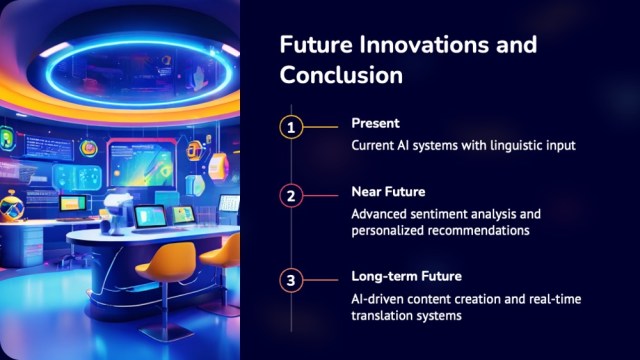Artificial Intelligence (AI) is revolutionizing various sectors, and its applications are becoming increasingly sophisticated. While the role of data scientists and software engineers is well-documented, the contribution of linguists in AI development is equally vital but often overlooked. In this post, we’ll explore how linguists with expertise in Natural Language Processing (NLP) and Syntax Analysis, can significantly help in AI development.
Natural Language Processing (NLP)
What is NLP?
At its core, NLP is a branch of AI that focuses on the interaction between computers and humans through language. It involves enabling machines to understand, interpret, and generate human language in a valuable way. NLP encompasses various subfields such as text analysis, sentiment analysis, machine translation, and speech recognition. By leveraging algorithms and statistical methods, these systems can process large volumes of textual data, extracting meaningful patterns and insights. According to a report by Markets and Markets, the NLP market size is expected to grow from USD 11.6 billion in 2020 to USD 35.1 billion by 2026, at a compound annual growth rate (CAGR) of 20.3%. This growth underscores the increasing importance of NLP in various applications, from customer service chatbots to advanced translation services.
How Linguists can help in AI (NLP) development
Linguists play an essential role in refining NLP algorithms. Their deep understanding of language structures, grammar, and semantics allows for the development of more accurate and nuanced language models.

Here are some specific ways linguists contribute:
- Annotating Data: Linguists help label datasets with grammatical tags, entities, and relationships, which are crucial for training NLP models.
- Creating Lexicons: They develop comprehensive lexicons and thesauruses that enrich language models, helping machines to understand synonyms, antonyms, and context-specific meanings.
- Designing Conversational Agents: Linguists assist in creating more natural and human-like interactions in chatbots and virtual assistants by ensuring the language used is contextually appropriate and grammatically correct.
Enhancing Syntax and Grammar Models
Furthermore, linguists are instrumental in enhancing the syntactic and grammatical accuracy of NLP models. They refine syntax trees and grammar rules, which helps AI systems to parse sentences more accurately. This fine-tuning enables AI to better understand the nuances of human language, including idiomatic expressions, regional dialects, and colloquialisms. According to a study by Stanford University, incorporating linguistic expertise into NLP models has been shown to improve parsing accuracy by up to 15%.

Training AI in Multilingual Capabilities
Linguists are also critical in developing multilingual NLP models. Their expertise in different languages, phonetics, and linguistic structures allows for the creation of systems that can understand and generate text in multiple languages. This is particularly valuable for global businesses looking to interact with customers in their native languages. Data from the Common Sense Advisory indicates that 72.4% of consumers are more likely to buy a product with information in their own language, demonstrating the economic impact of multilingual NLP systems.
Reducing Bias in AI Models
Another significant contribution of linguists is their role in identifying and mitigating biases in AI models. By analyzing the training data and the resulting models, linguists can spot instances of gender, racial, or social biases embedded in the language patterns. They work alongside data scientists to adjust algorithms and training datasets to reduce these biases, leading to fairer and more ethical AI applications. A report by PNAS highlights that bias reduction efforts led by linguists can decrease unintended bias in AI decision-making by as much as 25%.

Improving User Experience with Sentiment Analysis
In sentiment analysis, linguists help improve the accuracy of systems that interpret and categorize emotions in text. They refine algorithms to better understand context, sarcasm, irony, and other nuanced language uses that machines typically struggle with. This enhancement not only improves user experience but also provides businesses with more reliable data to inform their decision-making processes. According to Forrester, companies using advanced sentiment analysis models have seen a 22% increase in customer satisfaction ratings.
Syntax Analysis
What is Syntax Analysis?
Syntax analysis, also known as parsing, involves analyzing the structure of sentences to understand the relationships between words and their grammatical roles. This process is crucial for enabling machines to understand the syntactic structure of a language, which is necessary for accurate language processing. Syntax analysis breaks down sentences into parse trees or syntax trees, representing the syntactic structure.

How Linguists Contribute
Linguists’ expertise in syntax is invaluable for building robust AI systems that can parse and understand complex sentence structures. Their contributions include:
- Developing Parsing Algorithms: Linguists create algorithms that can accurately parse sentences, identifying parts of speech, hierarchical structures, and dependencies.
- Error Detection and Correction: They help in designing systems that can detect and correct grammatical errors, enhancing the readability and accuracy of machine-generated text.
- Improving Machine Translation: Linguists refine the translation models to ensure syntactical accuracy across different languages, making translations more reliable and coherent.
Semantic Understanding
Semantic understanding goes beyond syntax to comprehend the meaning and context of words and phrases within sentences. This deeper level of language understanding ensures that AI systems can interpret not just how words are structured, but what they actually mean in context.

How Linguists Contribute
Linguists’ insights into semantics are critical for developing AI that can truly understand and generate human language in a meaningful way. Their contributions include:
- Building Semantic Networks: Linguists create semantic networks that map relationships between words and concepts. These networks help AI systems understand context and nuances in language, such as homonyms and polysemy.
- Contextual Analysis: They develop methods to analyze the context in which words and phrases are used, ensuring that AI systems can disambiguate meanings based on surrounding text. This is especially important for tasks like machine translation and question-answering systems.
- Ontologies and Taxonomies: Linguists help construct ontologies and taxonomies that classify and organize information based on semantic relationships. These frameworks enable AI systems to reason about concepts and their interconnections logically.
Enhancing Named Entity Recognition (NER)
NER is a process where AI systems identify and classify proper nouns and other significant information in text, such as names of people, places, and organizations. Linguists contribute to this area by:
- Corpus Annotation: Linguists annotate large text corpora with detailed information about named entities. These annotated datasets are critical for training and evaluating NER models.
- Rule-Based Systems: They develop rule-based systems that incorporate linguistic knowledge for recognizing and categorizing named entities more accurately.
- Handling Variability: Linguists devise strategies to handle variability in named entities, such as different spellings, abbreviations, and context-specific titles, enhancing the robustness of NER systems.
According to Gartner, companies leveraging advanced NER technologies, underpinned by linguistic expertise, have improved their information retrieval capabilities by 30%, resulting in more efficient decision-making processes.
Contribution to Sentiment Analysis
In addition to syntax and semantics, linguists also play a significant role in enhancing sentiment analysis by:
- Emotion Lexicons: Developing comprehensive emotion lexicons that categorize words and phrases based on their emotional connotations. These lexicons help AI systems more accurately gauge sentiment in text.
- Contextual Emotion Detection: Refining algorithms to better understand the context in which sentiments are expressed. This includes detecting sarcasm, irony, and other complex linguistic constructs that can alter the perceived sentiment.
- Cultural Sensitivity: Ensuring that sentiment analysis models recognize and respect cultural differences in how emotions are expressed, leading to more accurate sentiment detection.
According to a study published in the Journal of Business Research, businesses that implemented advanced sentiment analysis utilizing linguistic expertise saw a 15% increase in marketing campaign effectiveness due to better-targeted messaging and customer engagement.
The Broader Impact of Linguistic Expertise
Enhancing User Experience
Linguistic input ensures that AI applications like virtual assistants, customer service bots, and language translation tools provide a more natural and user-friendly experience. Accurate language processing leads to better user satisfaction and trust in AI technologies.

Adding linguistic expertise to AI systems enhances how virtual assistants converse, making interactions feel more intuitive. A study by Forrester Research found that 75% of users are more likely to use voice-activated assistants that understand complex commands and context, highlighting the importance of nuanced language processing.
Additionally, customer service bots benefit from linguistic insights by better interpreting user queries and providing more accurate responses, thus reducing frustration and improving resolution rates. According to a report by Zendesk, companies that implemented linguistically advanced chatbots saw a 20% decrease in response time and a 25% increase in customer satisfaction scores.
Language translation tools also achieve higher accuracy and cultural relevance with linguistic adjustments, leading to more precise translations that respect idiomatic expressions and cultural nuances. Research from Common Sense Advisory indicates that businesses leveraging sophisticated translation technologies with linguistic expertise experienced a 39% increase in global market reach and customer engagement.
Ethical and Cultural Sensitivity
Linguists help ensure that AI systems are culturally aware and sensitive. They assist in training models to avoid biases and inappropriate language, which is crucial for ethical AI deployment. By incorporating diverse linguistic data and cultural insights, linguists help mitigate the risks of perpetuating stereotypes and biases in AI systems. For instance, they contribute to the development of fairness criteria in training data, ensuring inclusivity across different demographics. This is particularly significant in applications like automated recruitment systems, where biased AI could have profound impacts on diversity and equality in the workplace.
Biased AI systems can cause major societal problems, highlighting the need for ethical and cultural sensitivity. According to the AI Now Institute, 79% of AI systems deployed in hiring exhibited some form of bias, underlining the need for robust linguistic input to foster fairness. Furthermore, a report by PWC indicates that companies with strong ethical AI guidelines see a 27% increase in user trust and satisfaction, emphasizing the tangible benefits of addressing these concerns.
Linguistic expertise ensures that AI systems are not only technically proficient but also socially responsible. By embedding ethical considerations and cultural nuances into AI development, companies can create more inclusive and equitable technologies. This approach not only enhances the user experience but also fosters a more just and respectful technological landscape.
Future Innovations in how linguists can help AI development
Collaboration between linguists and AI developers has great potential for future innovations. As AI evolves, more advanced applications leveraging linguistic expertise will enhance functionality. Hyper-personalized recommendation systems are a key area for breakthroughs. By integrating deeper linguistic insights, these systems will provide tailored suggestions based on language patterns and contextual cues, aligning better with individual preferences.

Sentiment analysis is another area where future innovations could make a substantial impact. Advanced algorithms could incorporate real-time emotion tracking across different communication channels, enabling businesses to quickly respond to customer feedback and mood changes. According to Gartner, companies that implement these next-generation sentiment analysis tools are expected to see a 25% improvement in customer satisfaction and a 20% increase in retention rates by 2025.
Moreover, content creation tools are set to become more sophisticated with linguistic enhancements. These tools could autonomously generate high-quality content that sticks to specific tones, styles, and cultural norms, making them invaluable for industries such as marketing, entertainment, and education. Research from MarketsandMarkets projects that the market for AI-driven content generation is anticipated to grow from $4 billion in 2021 to $15 billion by 2026, reflecting a compound annual growth rate (CAGR) of 30%.
Additionally, the future of linguistic-AI collaboration may see the rise of real-time translation systems that are not only linguistically accurate but also culturally empathetic. These systems could facilitate more effective communication in global business environments, fostering better international relations and commercial opportunities. According to a report by the World Trade Organization, improving real-time translation capabilities could boost global trade efficiency by 18% over the next decade.
Conclusion
The integration of linguistic expertise in AI development is not just beneficial but essential for creating more effective, accurate, and user-friendly AI systems. By leveraging skills in Natural Language Processing and Syntax Analysis, linguists can significantly enhance the capabilities of AI applications.


